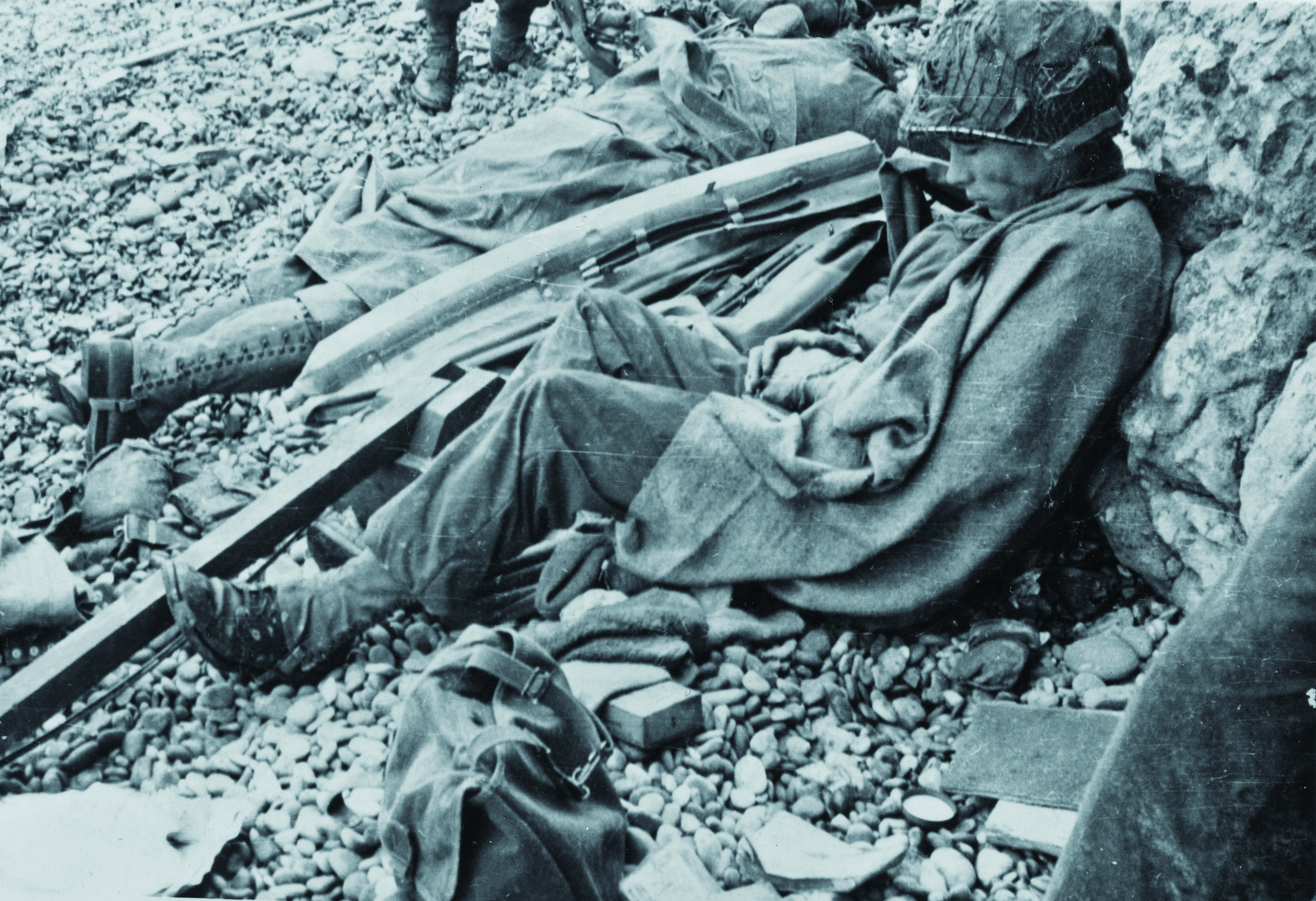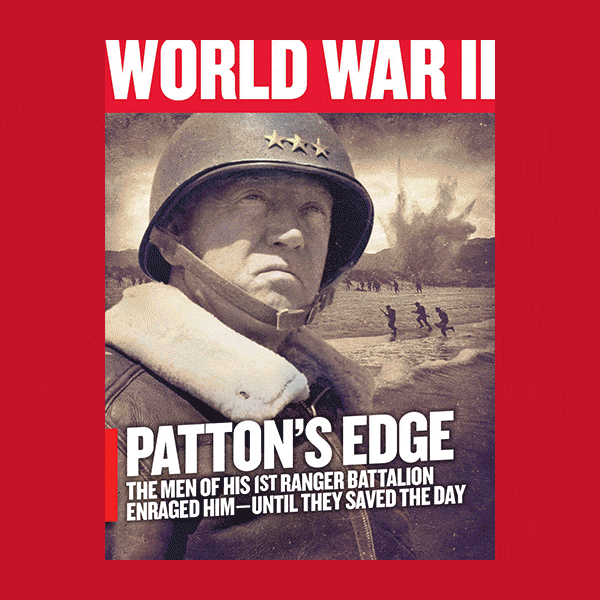Colorblindness kept Gordon Hearne out of the navy and air force. “But, as they say, if you can see lightning and hear thunder, you’re in the army!” he says with a laugh. As a gunner with the 447th Anti-Aircraft Artillery Automatic Weapons Battalion, he landed on Omaha Beach, Normandy, on June 7, 1944, with a 12-man recon detail. In July, his battalion was assigned to the 28th Infantry Division. He survived five European campaigns unscathed, returned to Los Angeles, and enrolled at the University of Southern California where, in 1948, he wrote about his war in the essay published below.
TAKE A SLOW LOOK at the horizon surrounding the crescent-shaped beach called “Omaha Red” in Normandy. It is an interesting panorama. In all that vast perimeter you will see no point where the sea meets the sky. Ships of all sizes—battlewagons, destroyers, carriers, LSTs, other landing craft, launches, army “ducks”—solidly fill the water. The sight is impressive, glorious, but loses some majesty to the memory of the day before, when you climbed into one of the box-like landing craft among the bodies of those who had gone before and crouched the eight uneventful miles to the French shore.
You sit numbly and marvel at the extraordinary redness of lifeblood, and, as the constriction starts in your gut, you know fear. As the craft’s ramp lowers you somehow get reaction from motor nerves, you move ahead, acting apart from yourself, scarcely hearing the officer’s periodic “Go…go…go….” You push yourself out into waist-deep water, wondering if you should take the waterproofing off your M1, wishing there were cover, for the first time feeling the nakedness of the battlefield, where you are so alone, so much the prey of human fear and terror, that the shore seems to move ahead.
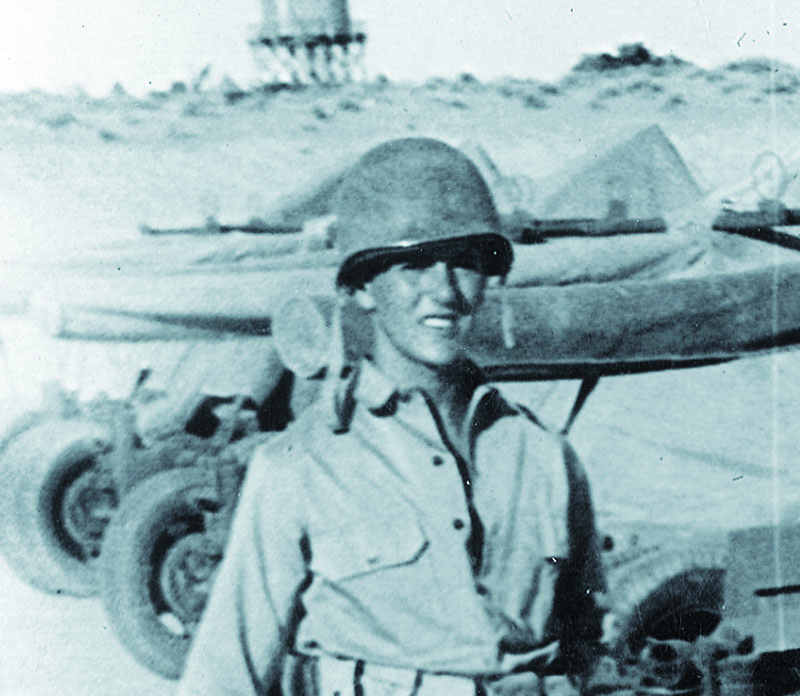
To show yourself is synonymous with death.
But the battlefield is still impressive on that second day. The huge shells from the battleships are screaming overhead toward unknown targets slightly inland. You take your eyes from the horizon and start down the beach with an empty five-gallon water can.
It is peaceful on the beach. There is not much activity. The calm seems unearthly, unnatural. Suddenly you sense why.
It is the dead.
At the water’s edge dead men float, jostled by rivulets—some face down, some staring skyward in wonder and disbelief. Most of those in the water were shot in the head — a surprising number between the eyes. This does not seem strange.
There are landing craft barriers at the water’s edge, made in the shape of children’s jacks, and about six feet high. A corpse lies under the nearest one, and other corpses huddle under and around many of the others, trying to find cover where there was none.
Overwhelming death has an eloquence all its own. You walk slowly down a dusty, shell-pocked road, and you are numb. Coherence leaves as you pass by hundreds and hundreds of bodies stilled in the attitude of advance … forward … the only way. A spirit more pervading and powerful than the soul within you wilts that soul and lifts it from you, and you are part of these men, and you know no emotion but humility and have no understanding but the affinity of beings.
Learn more about
Here a man lies prone, rifle still slanted, open right eye still sighting some unknown enemy. Both his legs are charred stumps. His feet rest neatly a few inches below. “Here’s a fellow who will never dance again,” is your first thought. No — he is dead. You pause to consider abstractly a man’s arm resting in the road. The hand is still intact. It is a good hand. How many ears of corn shucked how many evening papers on the lawn how many forward passes how many ivory keys how much love?
On an open stretch men have made a parapet of fallen comrades. But the men behind the parapet are dead, too. One leans backward, arms outstretched, eyes open and raised as if asking forgiveness for using the dead in such a way.
These men seem so young, so clean, so right for life. Red hair blond hair black hair brown hair brown eyes blue eyes gray eyes no eyes. Wedding rings, last letters from wives, from mothers, minds of hope, of ambitions, of courage, of weaknesses, of pettiness, of loves, bodies of sweating, of pitching hay, of square dancing, of the long plunge from the high board, of gentleness, of ecstasy, all stopped.
Stopped?
You do not tiptoe, but your feet do not quite seem to reach the ground.
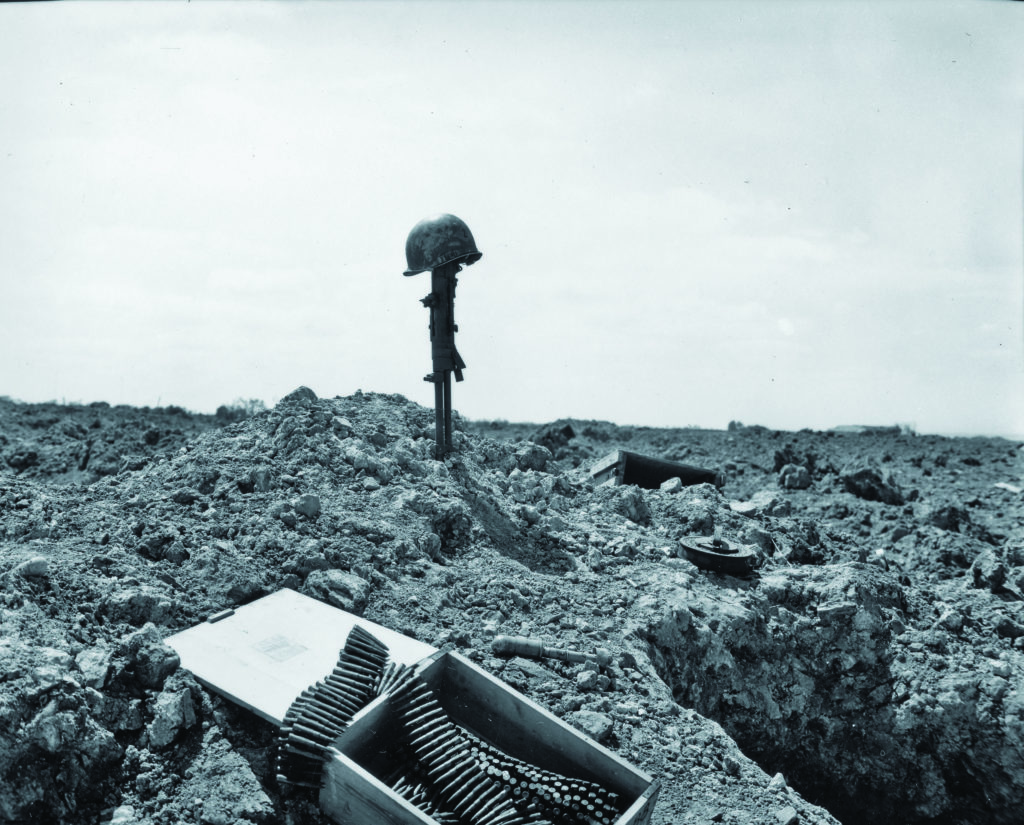
Humility — yes, that is the word, and you are part of all this and the word is humility. You are not apart, you are not lucky, it is not just chance. You will never condemn again completely, for your soul has been breathed upon oh yes you will be human, you will be petty, you will be selfish. You are still human but you have learned one thing and that is that the word is Humility.
Soon the dead men will be stacked in five-foot piles for burial.
Next afternoon you are dug in on the hill overlooking the beach, watching vehicles unload about a hundred yards below. A weapons carrier loaded with men curious about the lack of action rolls down the ramp and onto the beach and in a few feet hits a Teller mine that the engineers missed. The carrier leaps about four feet in the air and the powder and ammo begin exploding and it is just like the Fourth of July, only men are burning to death before your eyes and there is nothing you can do. Medics from the ambulance ahead run into the inferno because they think that is their job and soon they are torches writhing on the ground and you stare with compassion and you wonder. But you have a job to do, too, and this is a war.
War. There are many sides to war and most of them are hell. There is the fear — shell fear when the 88 bursts six feet from you and you claw hard ground with your fingers and shrapnel tears your rifle but misses you; violence fear, when shellfire kills a buddy instantly three feet from you and injures eight others and you lift the sergeant out of the gun pit with his left leg gone and holes all over him; combat fear, when you run up the hill and see machine gun bullets spatting into the dirt on each side of you, and many other kinds of fear, and they are all hell; and the worst of all, air raid fear, when you shake with hysteria and laugh and laugh, because after all it is funny.
Then there is the mud, which cannot be described in one word, and the rain and the snow and the cold, with the eager fingers to the exhaust and the numbing toes and the long months of eating sleeping riding in the mud with the mud throwing up on you and making a heavy coat all over you.
GET HISTORY’S GREATEST TALES—RIGHT IN YOUR INBOX
Subscribe to our HistoryNet Now! newsletter for the best of the past, delivered every Monday and Thursday.
And there is the food and the diarrhea and the loneliness and the love and the libido and the desire for release and softness and sensuality and satisfaction, and the fear that you may never know these things in completeness.
There are high points in your soul like the Liberation Parade in Paris, where the human spirit swelled and broke its bonds, and the beauty of nature, and the getting to know other peoples, but through it all a credo beating in your sensibilities like a pulse, and that credo is…
When will the war be over?
You will not forget these things. You will not live for them; they will slip back into your mind, but you will not forget them, for they have molded you. You will not forget the exaltation, the freedom, the lack of freedom, the tragedy, the horror, the retreat when your crew pulled out in frenzy with shells from a tank in the valley below whooshing close overhead with the unmistakable dynamic rush of air and bursting in the trees across the road, and the helter-skelter full-speed charges through newly shelled towns where wounded civilians lay in the streets screaming and begging for help, and the dead lay still.
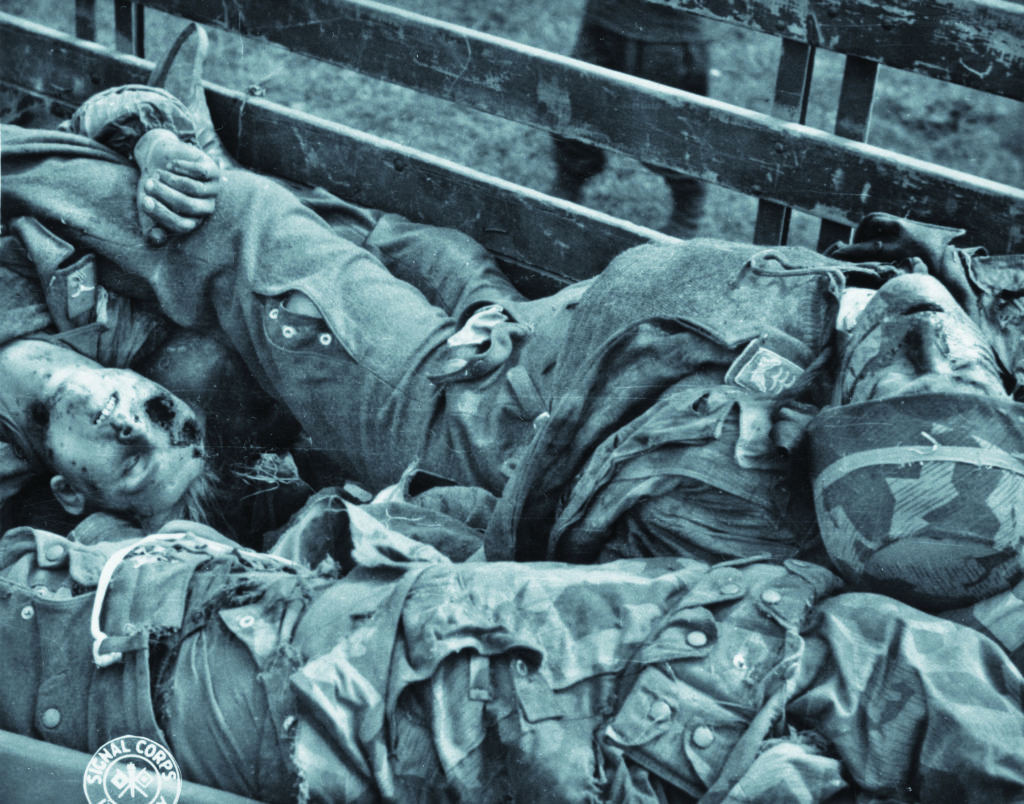
You will not forget the replacement named Red, or that Messerschmitt you shoot down.
Red is just 18, and has only been in the army two months. He has a little wife back home who is 17 and already pregnant. Red is sort of a fatalist and he has guts, that kid, but you can’t tell him anything. He isn’t afraid of shelling. Fuck ‘em, says Red. If you’re gonna get it you’re gonna get it. The first two shells aren’t too close, but we dive. Red doesn’t move, but even he knows the next one is for us and at the last instant he tries to make a foxhole. After that 88 hits gobs of mud come down for a while and when we look up Red is dead.
On a Bofors, you try to keep the upper bar of the Stiffkey stick parallel to a plane’s fuselage but each time your 40mm goes off it jumps a little and there are thousands of tracers going up there and it’s hard to tell which are yours. Tracers are floating down from the wings of the Messerschmitt. They all look like they’re headed your way but they pass behind you. When the 109 is overhead it flips on its back and loses altitude and crashes in the tall firs of the Hürtgen Forest, mowing down a swath of sturdy trees over 150 yards long.
Remember, the colonel said back in England—if you get just one plane in combat, you will have repaid many times the investment made in you and your equipment.
Even at the time you know it is the most wonderful, savage, educational, exciting, dreary, glamorous, monotonous experience you will ever have—haunting beauty compounded from pure ugliness. But….
When will the war be over?

